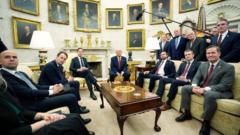The unauthorized disclosure of a Signal messaging group, which included high-level Trump officials discussing military strategies in Yemen, raises significant security concerns and highlights conflicting views on U.S. responsibilities towards European allies.
Security Breach in Trump’s Administration: Five Key Takeaways from Leaked Military Chat

Security Breach in Trump’s Administration: Five Key Takeaways from Leaked Military Chat
A look into a leaked Signal group chat reveals internal debates on military action against Houthis in Yemen and exposes concerns over European defense expectations.
The recent breach involving a military chat group within the Trump administration is sending shockwaves through Washington. The incident, reported by Jeffrey Goldberg of the Atlantic, reveals that he was added to a closed Signal messaging group comprising notable figures such as Vice President JD Vance and Defense Secretary Pete Hegseth, among others. The group's discussions centered around planned military strikes against the Iranian-aligned Houthi faction in Yemen.
Goldberg claims he was exposed to classified military operational details—target coordinates, weapon types, and timing—just hours before the strikes were executed, raising alarm about the potential fallout from such a security lapse.
One contentious debate emerged within the group, with Vice President Vance questioning the wisdom of military action, arguing that targeting Houthis in the strategically crucial Suez Canal serves European interests more than American ones. He warned that engaging in action could lead to an unfavorable spike in oil prices, reflecting the broader discussion about America's role in NATO and European defense.
Despite his reservations, Vance indicated a willingness to support military consensus but suggested a delay in carrying out the strikes, emphasizing the importance of thorough discussions with President Trump. In response to criticisms of European allies "free-loading," Vance and Hegseth voiced shared disdain, articulating their frustration about the United States repeatedly coming to Europe's aid.
Furthermore, a group member proposed that if the U.S. undertook military action at great expense, there should be financial benefits for the U.S. in return, highlighting tensions over economic compensation for military risks.
Following the military action, visual reactions on the messaging platform featured emojis, suggesting a mix of approval and foreboding among the officials regarding the effectiveness of their measures. As this incident unfolds, calls for an inquiry into the breach intensify, further complicating the backdrop of Trump's ongoing criticisms of the Biden administration's foreign policy.
In response to inquiries, Trump distanced himself from the group chat, claiming ignorance of the situation but continuing to support his national security adviser, Waltz. Notably, he has traditionally placed the blame for inadequate actions against Iran on the current administration, showcasing the ongoing political narrative as it relates to national security and foreign relations.






















